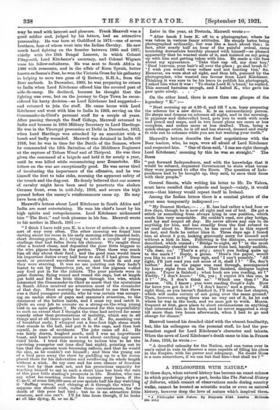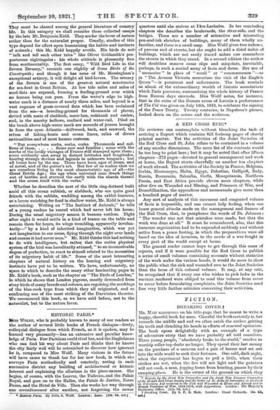A PHILOSOPHER WITH NATURE.* Di these days, when natural history
has become an exact science in which psychology plays a part, books like The Natural History of Selborne, which consist of observations made during country walks, cannot be treated as scientific works or even as natural history, however deep the love of nature which inspired them.
• 4 l'hiloscridwr with Nature. By Benjamin Kidd. London Methuen. 16a. net.1 They must be classed among the general literature of country-
life. In this category we shall consider these collected essays by the late Mr. Benjamin Kidd. They are for the lover of nature
rather than for the naturalist proper. Usually, studies of this type depend for effect upon hums ei7ing the habits and instincts of animals ; this Mr. Kidd happily avoids. His birds do not " talk and tell each other tales" like Oliver Goldsmith's pre- posterous nightingales : his whole attitude is pleasantly free from sentimentality. The first essay, " Wild Bird Life in the Severn Estuary," reminds one slightly of Some Birds of the Countryside ; and though it has none of 'Mr. MaRefegham's exceptional artistry, it will delight all bird-lovers. The estuary of the Severn is one of the greatest natural sanctuaries for sea-fowl in Great Britain. At low tide miles and miles of mud-flats are exposed, forming a feeding-ground over which no human being can pass. From the water's edge to high- water mark is a distance of nearly three miles, and beyond is a
vast expanse of grass-covered flats which has been reclaimed from the sea—a breeding-ground for thousands of plover, dotted with nests of shelduck, moor-hen, redshank and curlew, and, in the marshy hollows, mallard and water-rail. Piled on the beach above high-water mark are mounds of jetsam brought in from the open Atlantic—driftwood, bark, and seaweed, the refuse of fishing-boats and ocean liners, relics of divers nationalities and of most human customs.
"'But everywhere corks, corks, corks. Thousands and mil- lions of them. . . . Some new and familiar ; some with the marks of the lordly vintages of France still stamped upon them ; some evidently cast away in distant latitudes and longitudes, bearing strange devices and legends in unknown tongues ; but all borne here by the sea. There have been ages of stone, and of metal, and of the potter's art. But few of us realize that we are ourselves living m the most characteristic age of all—the Great Bottle Age ; the age when universal man drank things out of bottles and strewed the earth with the shards thereof and the ocean itself with the corks."
Whether he describes the nest of the little ring-dotterel built amid all this ocean rubbish, or shelduck, who are quite good friends with the rabbits, waddling among the rabbit-burrows, or a heron watching for food in shallow water, Mr. Kidd is always entertaining. Writing on " The Instinct of Animals," ho tells of a young cuckoo he reared which had never left his house.
During the usual migratory season it became restless. Night after night it would 'settle in a kind of trance on the table and remain there for hours, its wings trembling, apparently involun- tarily—" by a kind of inherited imagination, which was yet not imagination in our sense, flying through the night over lands and oceans it had never seen." Mr. Kidd thinks this had nothing to do with intelligence, but rather. that the entire physical system of the bird was hereditarily attuned, " to an inconceivable degree of perfection, to react to stimuli related to the necessities of its migratory habit of life." Some of the most interesting chapters of natural history on the homing and migratory instincts have yet to be written. We have, unfortunately, no space in which to describe the many other fascinating pages in Mr. Kidd's book, such as the chapter on "The Birds of London," in which he shows that London pigeons, mostly descended from stray birds of many breeds and colours, are regaining the markings of the blue-rock type from which they all originated, and so confirming one of the most striking of the Darwinian theories. We recommend this book, as we have said before, not to the naturalist, but to the nature lover.



































 Previous page
Previous page